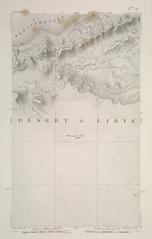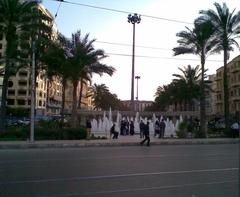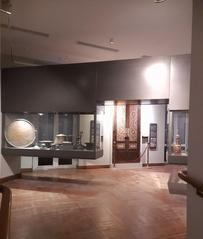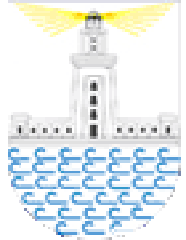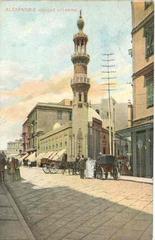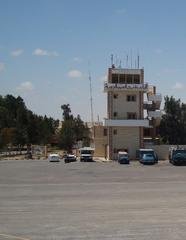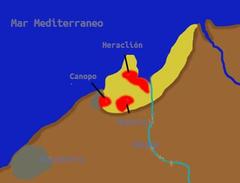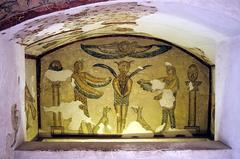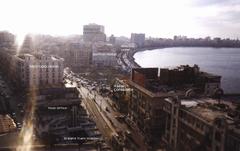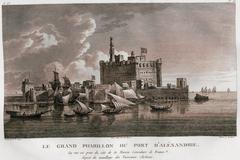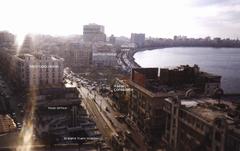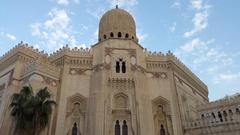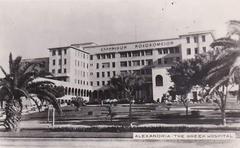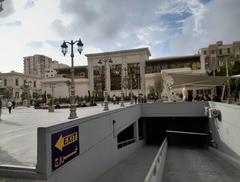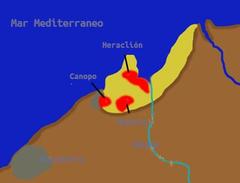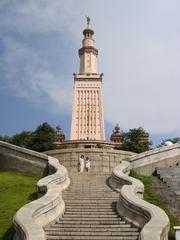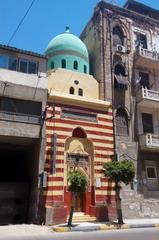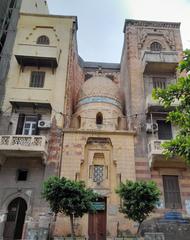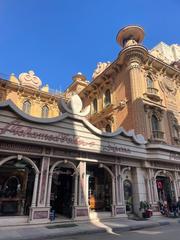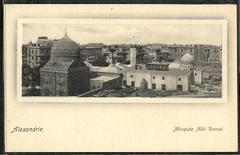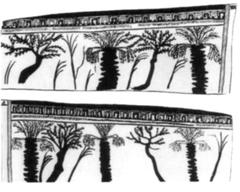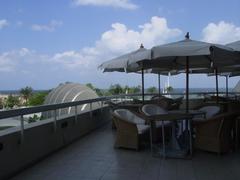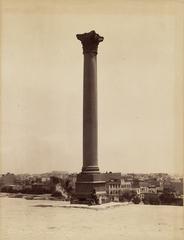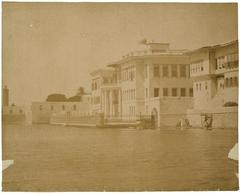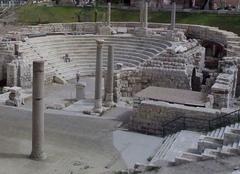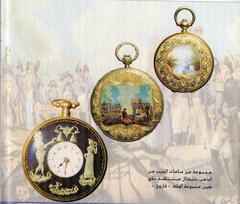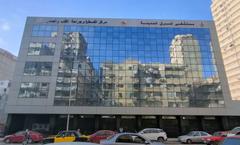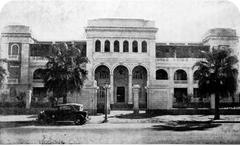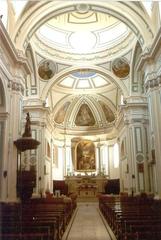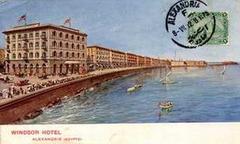Alexandria National University Visiting Guide: Hours, Tickets, and Nearby Attractions
Date: 14/06/2025
Introduction: Alexandria National University’s Significance
Alexandria National University (ANU) stands as a testament to Egypt’s ongoing commitment to academic excellence and cultural heritage. Established by presidential decree in 2022 as part of the broader Alexandria University system, ANU’s state-of-the-art campus in the Smouha district reflects both modern educational ambitions and Alexandria’s storied past. The university features a diverse range of faculties—including Medicine, Engineering, Law, Arts, and more—while fostering a vibrant atmosphere of research and innovation. This guide delivers detailed visitor information encompassing campus hours, ticketing, accessibility, and the rich opportunities for cultural and academic engagement ANU offers (Wikipedia, Alexandria University - About AU).
With its proximity to world-renowned historical landmarks like the Bibliotheca Alexandrina, Qaitbay Citadel, and Pompey’s Pillar, ANU offers visitors the unique chance to blend academic exploration with immersive cultural tourism (Magnificent Travel - Alexandria’s Heritage, ANU International Programs).
Table of Contents
- Introduction
- Visiting ANU: Hours, Tickets, and Accessibility
- Historical Background and Role in Egyptian Education
- Campus Layout, Facilities, and Technology
- Visitor Experience: Events, Tours, and Campus Life
- Transportation and Getting There
- Nearby Historical and Cultural Attractions
- International Recognition and Academic Collaboration
- Practical Visitor Tips and FAQ
- Conclusion
- References
Visiting ANU: Hours, Tickets, and Accessibility
Visiting Hours:
ANU is open to visitors from 8:00 AM to 5:00 PM, Sunday through Thursday. Visitors should bring valid identification and may be required to register at the main entrance. While there is no general entry fee, special events or visits to specific departments may require advance permission or registration.
Accessibility:
The campus is designed for inclusive access, featuring ramps, elevators, and adapted restrooms throughout all major buildings. Guided tours, though not regularly scheduled, can be arranged in advance by contacting the university (ANU International Programs).
Visitor Services:
Information desks, free Wi-Fi, prayer rooms, and gender-segregated restrooms are available across campus. Cafeterias serve both Egyptian and international cuisine at affordable prices.
Historical Background and Role in Egyptian Education
Founding and Early Development
ANU was founded in 2022 as a modern extension of the historic Alexandria University, which dates to 1938. The establishment of ANU supports Egypt’s broader strategy to decentralize higher education and promote academic growth beyond Cairo. The university rapidly developed an impressive range of faculties and services, drawing both local and international students (Alexandria University - About AU).
Educational Impact
As part of Egypt’s second-largest university system, ANU plays an essential part in developing the country’s intellectual and professional landscape. With faculties spanning Medicine, Engineering, Agriculture, Law, Commerce, Education, and more, the university’s multidisciplinary approach is central to addressing national and regional challenges (Education Vibes - Alexandria University).
Campus Layout, Facilities, and Technology
Location and Design
The ANU campus occupies 30 acres in the Smouha district, providing a modern, accessible environment within reach of Alexandria’s urban amenities. Buildings are purposefully organized for ease of navigation and integration, with academic, administrative, and student facilities all within walking distance (Wikipedia).
Academic Structure
ANU comprises 14 faculties, including Medicine, Engineering, Pharmacy, Dentistry, Law, Commerce, Agriculture, Arts, Science, Veterinary Medicine, Fine Arts, Education, Tourism and Hotels, Physical Education, and Nursing. Each faculty offers undergraduate and postgraduate programs, with curricula designed to balance theoretical knowledge and practical skills (StandYou).
Courses are primarily taught in Arabic, with some programs and modules in English to support international students and align with global standards.
Teaching and Research Facilities
State-of-the-art lecture halls, interactive classrooms, and specialized laboratories support dynamic learning and research. The central library and faculty-specific libraries provide access to print and digital resources. Multiple research centers, such as the Institute of Graduate Studies and Research and the Institute of Medical Research, foster interdisciplinary projects and innovation (StandYou).
Student Accommodation and Amenities
Six modern student hostels provide secure, comfortable housing for local and international students, complete with internet access, laundry, and communal kitchens (Study in Egypt). Recreational facilities, sports fields, medical clinics, and career counseling services are also available.
Digital Infrastructure
ANU is committed to digital transformation, with high-speed Wi-Fi campus-wide, computer labs, and ISO 9001/2015-certified administrative systems. Investments in smart classrooms, e-learning platforms, and virtual labs are ongoing (Study in Egypt).
Visitor Experience: Events, Tours, and Campus Life
Cultural Events and Festivals
ANU hosts annual events such as the Alexandria Cultural Festival in March, which features performances, exhibitions, and workshops open to both the university community and the public. These events showcase Egypt’s diverse traditions and support intercultural dialogue (Education Vibes - Student Life).
Guided Tours and Services
Although guided tours are not held regularly, prospective students and groups may arrange tours in advance. Maps and information are available at campus entrances, and virtual tours can be accessed on the ANU International Programs website.
Dining and Retail
On-campus cafeterias and shops offer a selection of local and international foods, as well as daily necessities and university merchandise. The Corniche waterfront nearby is renowned for its seafood restaurants and street food options.
Transportation and Getting There
By Air:
The nearest airport is Borg El Arab International Airport (HBE), about 40 km from central Alexandria. Taxis and ride-hailing services like Uber and Careem provide direct campus transfers.
From Cairo:
- Private Car/Transfer: 2.5–3 hours by road.
- Train: Direct trains from Cairo Ramses Station to Alexandria take approximately 2.5–3 hours (Egyptian National Railways).
- Bus: Companies like GoBus offer comfortable routes in 3–4 hours.
Within Alexandria:
Taxis, ride-hailing apps, and buses connect the city to campus. Note that the tram system does not serve the Abis/Smouha campus area.
Nearby Historical and Cultural Attractions
- Bibliotheca Alexandrina: A modern cultural landmark, open daily 10:00 AM–7:00 PM. Entry: ~EGP 60 (details).
- Qaitbay Citadel: 15th-century fortress; open 9:00 AM–5:00 PM. Entry: ~EGP 50.
- Pompey’s Pillar: Ancient Roman column with adjacent ruins. Entry: ~EGP 30.
- Alexandria National Museum: Collection spanning Pharaonic to Islamic eras; open 9:00 AM–4:00 PM (closed Fridays). Entry: EGP 100.
These sites are all within short taxi or bus rides of the university and are essential stops for visitors interested in Alexandria’s unique blend of ancient and modern heritage.
International Recognition and Academic Collaboration
ANU and Alexandria University are internationally recognized, ranking highly in national and global university indexes (Education Vibes - Ranking). The Medical Faculty is particularly distinguished, with English-medium programs accredited by international bodies such as the Medical Council of India and the World Health Organization (Education Vibes - Accreditation).
ANU is involved in over 240 international agreements with 58 countries, providing students and faculty opportunities for exchanges, joint research, and dual degrees (Study in Egypt).
Practical Visitor Tips and FAQ
- Campus Access: Present valid ID at the main gate; guided tours require advance arrangement.
- Dress Code: Modest attire is recommended, especially in academic areas.
- Language: Arabic is primary, but English is widely spoken in international programs.
- Currency: Egyptian Pound (EGP); ATMs available on campus and citywide.
- Safety: Campus has 24/7 security; follow instructions from security staff.
- Weather: The best seasons to visit are spring (March–May) and autumn (September–November).
Frequently Asked Questions
Q: What are the ANU visiting hours?
A: 8:00 AM to 5:00 PM, Sunday to Thursday.
Q: Is there an entry fee?
A: No, general campus admission is free; special events may require registration.
Q: Are guided tours available?
A: Yes, by advance request through the university’s visitor center.
Q: How can I arrange academic visits or attend lectures?
A: Email [email protected] before your visit.
Q: How do I get to ANU from Cairo?
A: By car, train, or bus; the train is efficient and comfortable.
Conclusion
Alexandria National University is more than a center of academic achievement—it’s a gateway to Alexandria’s enduring cultural legacy. Visitors are welcomed to explore its innovative campus, participate in cultural festivals, and immerse themselves in the city’s nearby historical sites. Whether you’re a student, academic, or traveler, ANU provides a rewarding intersection of learning and discovery. For the latest information, download the Audiala app, follow ANU on social media, and consult official university resources before your visit.
References and Further Reading
- Alexandria University - About AU
- Wikipedia - Alexandria National University
- Education Vibes - Alexandria University
- Magnificent Travel - Alexandria’s Heritage
- StandYou - Alexandria University Campus and Academic Programs
- Study in Egypt - Alexandria University Admissions and Facilities
- ANU International Programs
- BridgeMedEd - Alexandria University Cultural Activities
